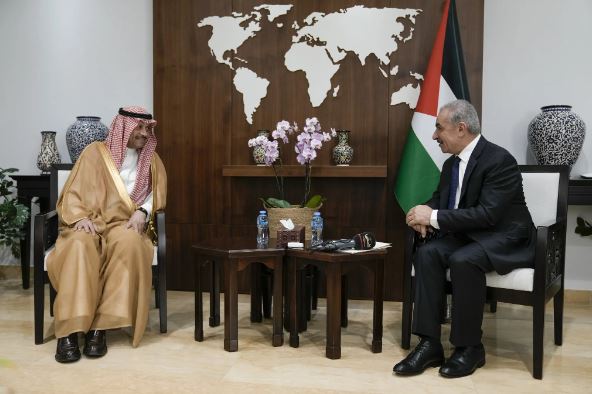The rapidly improving relations between Israel and the most powerful Arab state were on display this week with the simultaneous travels of an Israeli minister to Saudi Arabia and a Saudi envoy to the Israeli-occupied West Bank.
Israeli Tourism Minister Haim Katz made history this past Tuesday and Wednesday when he became the first sitting Israeli minister to publicly visit the Arab country, when he participated in a United Nations-sponsored global tourism conference in the capital city of Riyadh.
At the same time, Naif al-Sudairi, the Saudi envoy to the Palestinians, crossed into the West Bank through an Israeli checkpoint to meet with the leaders of the Palestinian Authority, which is responsible for governing little under 40% of the region under Israeli control.
The territory has not seen a Saudi official since Israel conquered it from Jordan in the 1967 war between Israel and its Arab neighbours, but Mr. Sudairi, who is based in neighbouring Jordan, made the first known visit by a Saudi official to the region.
The two trips, unthinkable for much of Israel’s history, symbolised the slow setting in motion of the formalisation of the relationship between Israel and Saudi Arabia, despite increasing attempts by the United States to negotiate a settlement between the two nations.
There has been a hiatus in peace discussions between Israeli and Palestinian authorities for over a decade, but now its leaders have signalled that they are considering recognising Israel.
Israel and three Arab governments signed three agreements in 2020, coordinated by the Trump administration, to increase commercial and military cooperation in the face of shared concerns about Iran.
Riyadh wants increased military support from Washington in exchange for normalisation, and it wants US and Israeli backing for a civil nuclear programme in Saudi Arabia.
Diplomats believe it is unclear what specific concessions Riyadh would want from Israel over the Palestinians.
On Tuesday, when visiting the Palestinian Authority, the Saudi envoy, Mr. Sudairi, stated that the 2002 Arab Peace Initiative, which was backed by Saudi Arabia and advocated for the creation of a Palestinian state, remained “a cornerstone of any future agreement.”
However, in his interview from last week, Prince Mohammed provided greater wiggle room. In a more nebulous language, he said any agreement should “ease the life of the Palestinians,” which some analysts have interpreted to mean more money for the Palestinian Authority rather than independence.
Some politicians and officials in the United States and Israel are opposed to supporting a Saudi nuclear programme because of concern that the country may one day use the technology to develop a nuclear weapon.
Like the Palestinians, the most nationalistic Israeli ruling coalition in history would be outraged by any compromise to them. However, if the Saudi leadership normalises ties with Israel for too little gain to the Palestinians, it risks angering its own population as well as the wider Muslim world.
Mr. Sudairi’s last-minute decision on Wednesday to cancel a visit to the Aqsa mosque in Jerusalem, a holy site important to Jews and Muslims that is controlled and policed by Israel, reflects the sensitivity of the current situation. Visiting the site while accompanied by Israeli security personnel might be interpreted as recognising Israeli sovereignty over the area.
Separately, on Wednesday the United States stated that beginning in the month of November, citizens of Israel will no longer need a visa to enter the country. Part of the reason for the long-awaited change is that Israel has recently lifted its visa requirement for U.S. citizens of Palestinian descent to visit Israel, with the exception of a few hundred residents of the Gaza Strip.
This is the latest in a series of recent actions taken by the Biden administration that have been met with widespread approval in Israel and helped calm tensions with Mr. Netanyahu.
U.S. officials, including President Biden, have previously voiced their displeasure with Mr. Netanyahu over his divisive efforts to constrain the authority of Israel’s Supreme Court and his consolidation of Israeli rule over the West Bank.
However, despite tensions between the two leaders, the essential features of the U.S.-Israel cooperation have remained unaltered, as seen by the visa waiver decision, the Saudi mediation, and Mr. Biden’s decision last week to welcome Mr. Netanyahu to the White House.
